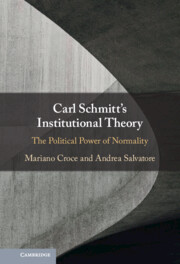Book contents
- Carl Schmitt’s Institutional Theory
- Carl Schmitt’s Institutional Theory
- Copyright page
- Contents
- Acknowledgements
- Introduction
- 1 What Is Exceptionalist Decisionism?
- 2 Looking Backwards
- 3 How Exceptionalist Decisionism Came About
- 4 A Fresh Start
- 5 Out of the Exceptionalist Quagmire
- 6 The Politics of Normality
- 7 Doing Away with Politics
- Conclusion
- References
- Index
5 - Out of the Exceptionalist Quagmire
The Notion of Institution in Schmitt’s Thinking
Published online by Cambridge University Press: 23 June 2022
- Carl Schmitt’s Institutional Theory
- Carl Schmitt’s Institutional Theory
- Copyright page
- Contents
- Acknowledgements
- Introduction
- 1 What Is Exceptionalist Decisionism?
- 2 Looking Backwards
- 3 How Exceptionalist Decisionism Came About
- 4 A Fresh Start
- 5 Out of the Exceptionalist Quagmire
- 6 The Politics of Normality
- 7 Doing Away with Politics
- Conclusion
- References
- Index
Summary
Chapter 5 investigates the notion of institution in Schmitt’s thinking. It begins by debating a recent interpretation of his work that attaches particular importance to his enduring concern with the life of institutions and how they ensure the stability of a community’s political life. The chapter first examines the strengths of this ‘pan-institutionalist’ reading and then digs out its main flaw as it downplays how Schmitt’s concept of institution changed over time. While Schmitt harboured a ‘thin’ notion of institution until the end of the 1920s, as an agency or public body (say, the state or the Church) endowed with organisational power, he headed towards a ‘thick’ conception after his encounter with Maurice Hauriou’s and Santi Romano’s institutional theories. The chapter continues by unearthing the main features of Schmitt’s thicker notion of institution and how he came to elaborate on his concrete-order thinking in On the Three Types of Juristic Thought (1934). This account is key to understanding the way he overturned the conception of normality that came with his previous exceptionalist decisionism. In 1934, the exception was eventually demoted to a truly exceptional case to be warded off, while normality was presented as the seedbed of legal normativity.
- Type
- Chapter
- Information
- Carl Schmitt's Institutional TheoryThe Political Power of Normality, pp. 84 - 105Publisher: Cambridge University PressPrint publication year: 2022



